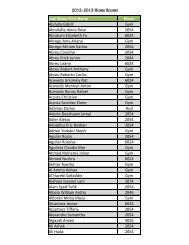standards citywide - New York City Department of Education - NYC ...
standards citywide - New York City Department of Education - NYC ...
standards citywide - New York City Department of Education - NYC ...
Create successful ePaper yourself
Turn your PDF publications into a flip-book with our unique Google optimized e-Paper software.
2PROMOTING POSITIVE STUDENT BEHAVIOREach school is expected to promote a positive school climate and culture that provides students with a supportive environment in which to growboth academically and socially. Schools are expected to take a proactive role in nurturing students’ pro-social behavior by providing them witha range <strong>of</strong> positive behavioral supports as well as meaningful opportunities for social emotional learning. Effective social emotional learninghelps students develop fundamental skills for life effectiveness, including: recognizing and managing emotions; developing caring and concernfor others; establishing positive relationships; making responsible decisions; and handling challenging situations constructively and ethically.Such skills help prevent negative behaviors and the disciplinary consequences that result when students do not live up to behavioral <strong>standards</strong>.Student engagement is also integral to creating a positive school climate and culture that effectively fosters students’ academic achievementand social/emotional growth. Providing students with multiple opportunities to participate in a wide range <strong>of</strong> pro-social activities and, at thesame time, bond with caring, supportive adults mitigates against negative behaviors. Examples can include: providing students with meaningfulopportunities to share ideas and concerns and participate in schoolwide initiatives; student leadership development; periodic recognition <strong>of</strong> students’achievements in a range <strong>of</strong> academic and co-curricular areas; using corrective feedback; and developing schoolwide positive behaviorsystems. Such opportunities, coupled with a comprehensive guidance program <strong>of</strong> prevention and intervention, provide students with the experiences,strategies, skills, and support they need to thrive.PREVENTION AND INTERVENTIONSchool personnel are responsible for developing and using strategies that promote optimal learning and positive behavior throughout astudent’s school experience. They are also responsible for addressing behaviors which disrupt learning. Administrators, teachers, counselorsand other school staff are expected to engage students, including students with disabilities, in intervention and prevention strategies thataddress a student’s behavioral issues and discuss these strategies with the student and his/her parent. Intervention and prevention approachesmay include guidance support and services to address personal and family circumstances; social/emotional learning, such as conflict resolution/peermediation/negotiation, anger management, and/or communication skills acquisition; the use <strong>of</strong> alternate instructional materialsand/or methods; enrichment services; alternate class placement; and/or development or review <strong>of</strong> functional behavioral assessments andbehavioral intervention plans which should be developed and/or reviewed as an early intervention strategy. If, at any time, school <strong>of</strong>ficialssuspect that a student’s difficulties may be the result <strong>of</strong> a disability which may require special education services, the student should be referredimmediately to the Committee on Special <strong>Education</strong>. Through the use <strong>of</strong> intervention and prevention strategies that engage students and givethem a clear sense <strong>of</strong> purpose, school staff facilitate students’ academic and social-emotional growth and assist them in following school rulesand policies.PARENTS AS PARTNERSStudents, parents and school personnel all have a role in making schools safe and must cooperate with one another to achieve this goal.School staff should keep parents informed <strong>of</strong> their child’s behavior and enlist parents as partners in addressing areas <strong>of</strong> concern. Outreachto parents can include, but is not limited to, a phone call and/or a written communication. As role models, parents and school staff shouldexhibit the behaviors which they would like to see students emulate. To ensure that parents become active and involved partners in promotinga safe and supportive school environment, parents must be familiar with the Discipline Code. Educators are responsible for informing parents








